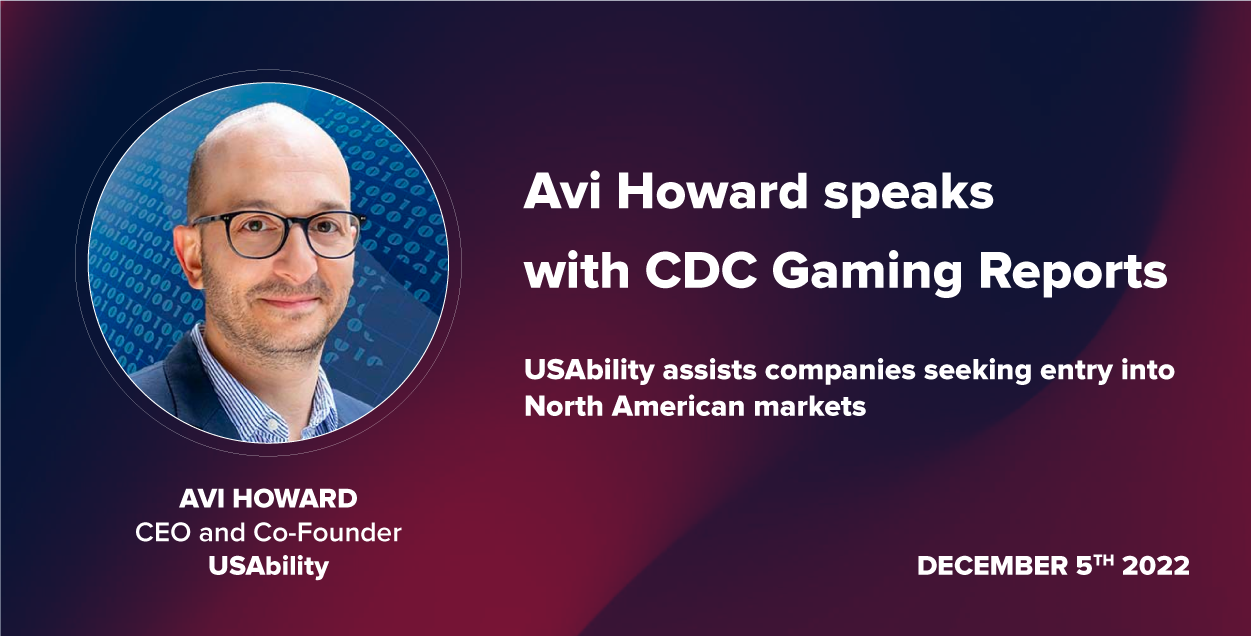It’s not the most glamorous issue facing the gaming industry, but compliance is critically important particularly as new markets emerge.
According to USAbility’s Avi Howard, navigating the complex network of North American jurisdictions is especially problematic for companies unfamiliar with regulations and requirements that tend to vary from state to state.
“A lot of companies underestimate what it means to be in the market, especially with European operators coming in,” says Howard, who co-founded USAbility and serves as CEO. “They clearly only see the technology and product coming in, the main things where the heavy lift is.
“But many were absolutely surprised that there are a variety of challenges in other areas, such as the fact that if you’re coming from outside the U.S., you need to build a fully self-sufficient, sustainable business within the United States. It cannot be an extension of your European business.”
USAbility, based in Malta, provides compliance/certification management, data migration and program management services for companies seeking to enter North American and global markets. With clients including LeoVegas and Caesars Entertainment the company specializes in program management, business and operational readiness, and multi-state solution architecture.
Howard says the idea for USAbility blossomed shortly after the Professional and Amateur Sports Protection Act was overturned in 2018. The company launched in December 2019, and at the global gaming conference ICE London in 2020, “there was a queue of companies wanting to talk to us,” he says.
The COVID-19 pandemic, Howard notes, wiped out a lot of “aspirational companies” that weren’t adequately equipped to enter U.S. markets. But in the summer of 2020, as better-funded operators began to explore domestic gaming opportunities, many still “underestimated the effort and investment” needed to stake their business in the country.
Ongoing issues affecting entrance into North American markets, including more expensive labor and supply costs, staff shortages, and matters relating to the war in Ukraine, have resulted in “a crawling pace of operators making it into the market,” Howard says.
When USAbility was launched, Howard surmised that most of its customers would be based in Europe since they “don’t know much about (U.S.) regulations. It’s intimidating.” And at first, the company’s portfolio primarily consisted of European interests.
But in late 2021, USAbility saw a “massive shift in interest” from U.S. companies. European companies, Howard says, had concerns about dealing with the U.S. regulators because of complex negotiations with European regulators, who “are quite intimidating.”
But U.S. companies, while used to dealing with burdensome jurisdictional requirements, often had concerns about the amount of work needed to be done to operate in various locales.
“The holy grail of what we’re interested in doing is a technology and business migration from any type of big change,” Howard says, “whether it’s a merger & acquisition or two companies integrating on a business demo, we are experts on that.”
In addition to regulatory compliance, USAbility does gap analysis – the feasibility and sustainability of technology stacks in jurisdictional ecosystems. The company has worked with more than 15 operators and B2B firms over the last two-and-a-half years seeking entry into American markets.
“A lot of them have underestimated the effort and the investments that are required,” Howards says, adding that even large operators don’t have the resources to navigate the requirements of every state.
When entering states, Howard notes that operators quickly need to “measure what technology they have in-house” and quickly adapt their technology and platforms. USAbility streamlines this process for operators.
The issue is especially complex for sports betting platform providers. USAbility provides solutions to market entry issues, a process that Howard thinks is sometimes overlooked.
“Every client comes with different market access deals in different states,” Howard says. “They start talking to five different potential operators, and these five potential operators may be covering over 20 states depending on how diverse their market access is. No platform provider in this economy is good enough to get their B2B platform 100 percent ready in so many states.
“We help companies not just understand what they’re missing,” Howard concludes, “but we also we help them with the design, i.e., writing specifications for their own development, what they need to develop to bridge the gap.”




